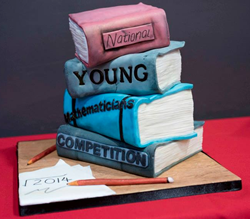Or search by topic
Number and algebra
Geometry and measure
Probability and statistics
Working mathematically
Advanced mathematics
For younger learners
Published 2015 Revised 2019
What Is the Explore Learning Mathematicians' Award (formerly Known as the National Young Mathematicians' Award)?
NRICH has worked with Explore Learning since 2010 to hold the Explore Learning Mathematicians' Award (formerly known as the National Young Mathematicians' Award). Each year, teams of four primary children from schools across the UK take part in local events then five teams are chosen to
come to NRICH headquarters in Cambridge for the final. Since 2018, there has also been a secondary competition.
 In 2019/20, the five primary finalists were:
In 2019/20, the five primary finalists were:
And the winners were... Nascot Wood!
The five secondary finalists in 2019/20 were:
And the winners were... Denmark Road!
At each stage of the competition, teams work on an NRICH task and are judged on two things: how well they use their problem-solving skills to think like mathematicians and how well they work as a team.
The tasks are particularly challenging and are likely to seem quite different to the sorts of maths activities you might see at most schools.
Our National Young Mathematicians' Award Feature brings together some of the ELMA (formerly NYMA) activities so why not have a go? You could even ask your teacher to enter a team from your school this year! If you are a teacher reading this, please take a look at our teacher feature Using National Young Mathematicians' Award Tasks to Develop
Problem-solving and Group-working Skills.
Here is a complete list of all the tasks that have been developed for the ELMA:
2010 - Button-up, Button-up Some More, Curious Number and Inky Cube
2011 - Walking the Squares, So It's Times, It's Times Again and Building with Rods
2012 - Make Those Bracelets, Snake Coils and Dice in a Corner
2013 - The Dice Train, Ribbon Squares and Cover the Tray
2014 - Six Ten Total, Display Boards and Six Numbered Cubes
2015 - Centred Squares, Dice Stairs and Open Boxes
2016 - Dart Target, Open Squares and Painting Possibilities
2017 - Making Pathways, Diagonal Spiral and Jigsaw Pieces
2018 - Sticky Dice, Folded Number Line and Wire Cages
2019/20 - Rod Area and Charitable Pennies

